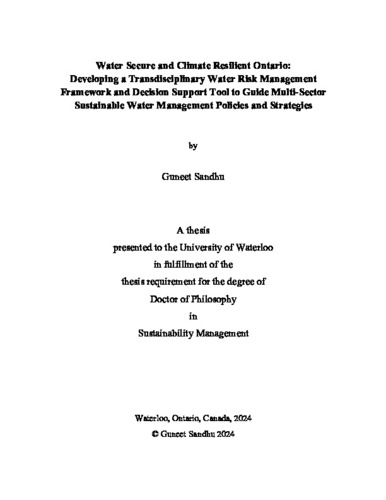| dc.description.abstract | Sustainable management of water resources, which provide critical social, economic, cultural, and ecological functions, is essential for sustainable development, yet risks to water security are growing. The province of Ontario is an interesting case for investigating water risks, risk perception, and water risk management. Nestled between the Great Lakes, a “myth of water abundance” exists amidst a myriad of local water challenges, including the lack of safe drinking water in Indigenous communities, dwindling flows, groundwater overextraction, deteriorating water quality, regulatory complexity, and water-user conflicts. While academic interest in water risk assessment and sustainable water management is growing, the literature reveals limited interdisciplinary investigation of local water risks and how these risks are perceived, evaluated, and managed by influential non-state actors like the corporate and financial sector. Addressing these gaps, this dissertation focused on its phenomenon of interest of water security risks in Ontario. It executed a three-stage interconnected objective and examined water risk assessment, perception, evaluation, and management using a novel normative-analytical theoretical framework.
The first stage assessed interdisciplinary biophysical and social water risks at the sub-watershed scale in Ontario using secondary data analysis. It found high and moderate risk in at least 50% of studied sub-watersheds for all water risks, challenging the myth of water abundance. The second stage examined water risk perception and evaluation in the corporate and financial sector, using explanatory mixed methods (survey followed by interviews). It confirmed that risk-centric, individual-centric (cognitive, affective, socio-cultural demographic, trust-based), and spatial factors generate risk perception and impact water risk evaluation. Thus, revealing the nuanced model of expert risk perception. The third stage investigated water risk management strategies using a survey and interviews of corporate and financial practitioners. Moreover, using transdisciplinary approaches, it developed a contextually-attuned water risk decision support tool to guide multi-sector sustainable water management policies and strategies in Ontario. The results emphasize a combination of regulatory, voluntary, and multi-stakeholder participatory approaches, tailored based on the sector, location, and context, and risk severity, is necessary. Moreover, the criteria of flexibility, efficiency, strategic incentives, economic, and regulatory signals are essential.
This dissertation contributes to the knowledge in the fields of sustainability management, socio-hydrology, risk analysis, and water resources management. It is the first-of-a-kind comprehensive scholarship to address the wicked sustainability issue of water security using social-ecological perspectives and Risk Theory, a new theoretical arena, intersecting multiple disciplinary paradigms to empirically validate the normative-analytical theoretical framework for water. The interdisciplinary water risk assessment revealed a higher total water risk, highlighting the importance of including contextual variables. Revealing the impact of risk perception on water risk evaluation and management in the corporate and financial sector, the dissertation challenges the rational risk perception model of experts and practitioners, hence making a novel empirical contribution to risk analysis. Finally, the dissertation demonstrates the use of interdisciplinary data, transdisciplinary methods, and normative-analytical theoretical frameworks to investigate nuanced systems-based constructs like water risks, water risk perception, and develop decision support tools. Thus, advocating for widespread inclusion of interdisciplinary and transdisciplinary approaches in sustainability management research. | en |

